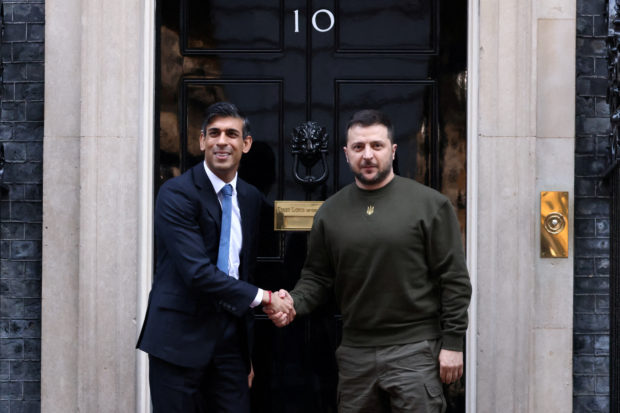
Ukraine’s President Volodymyr Zelensky and British Prime Minister Rishi Sunak meet outside Number 10 Downing Street in London, Britain, February 8, 2023. REUTERS/Henry Nicholls
KYIV/LONDON — Ukrainian President Volodymyr Zelensky embarked on a European tour on Wednesday to drum up aid, winning a British pledge to train Ukrainian pilots on advanced NATO fighter jets, a big step up in Western military support.
On just his second trip abroad since Russian forces invaded Ukraine last year, he met British Prime Minister Rishi Sunak and addressed parliament in London.
He was later due in Paris for dinner with French President Emmanuel Macron and German Chancellor Olaf Scholz, before a European Union leaders’ summit in Brussels.
In his speech to British lawmakers, Zelensky repeatedly hammered home his plea for combat aircraft, which he referred to as “wings for freedom”. Western countries have so far stopped short of providing warplanes or weapons that can strike deep inside Russia.
Ukraine “will do everything possible and impossible to make the world provide us with modern planes to empower and protect pilots who will be protecting us,” Zelensky said. He gave a pilot’s helmet to parliamentary speaker Lindsay Hoyle carrying the message: “We have freedom, give us wings to protect it”.
Two years ago he had left the British parliament thanking lawmakers for “delicious English tea”, Zelensky said. Now he would leave “thanking you in advance for powerful English planes”.
Shortly before his arrival, Britain announced plans to expand a programme training Ukraine’s military to ensure its pilots could fly sophisticated NATO-standard fighter jets.
The announcement gave no timeframe and stopped short of a commitment to provide Kyiv with British jets. But it signalled a notable shift in support that could pave the way for other countries to send planes.
Sunak told parliament that Britain would give Ukraine the support it needs to ensure a military victory this year.
Zelensky’s tour of Europe follows a surprise visit to Washington in December, and the choreography of meeting the British, French and German leaders the same day was a sign of his assiduous care in cultivating Western leaders and opinion.
As Zelensky wrapped up his London speech, air raid sirens rang out in the Ukrainian capital Kyiv. An all-clear later sounded.
He was also due to meet King Charles and visit Ukrainian troops training in Britain. Sunak’s office announced the addition of new names to Britain’s Russia sanctions blacklist, as well as plans for more military equipment for Kyiv, including unspecified longer range weapons.
Germany’s Scholz, speaking to lawmakers in Berlin, said he expected strong demonstrations of support for Ukraine from this week’s EU summit, and a new round of European sanctions on Russia around the anniversary of the invasion.
Scholz, publicly more cautious than some other Western leaders on arms deliveries, said decisions on weapons were best when coordinated behind the scenes, rather than announced by countries in a “public competition to outdo each other”.
Ukrainian President Volodymyr Zelensky (3rd left) arrives with British Prime Minister Rishi Sunak for a visit to meet Ukrainian troops being trained to command Challenger 2 tanks during his first visit to the UK since the Russian invasion of Ukraine at a military facility in Lulworth, Dorset, Britain Wednesday February 8, 2023. Andrew Matthews/Pool via REUTERS
Scaled-up pledges
Western countries have scaled up their pledges of military support for Ukraine since the start of the new year, culminating with an offer last month of tanks. Kyiv still wants longer range missiles as well as warplanes.
After major Ukrainian gains in the second half of 2022, Russia has recovered momentum, sending tens of thousands of freshly mobilised troops to the front. They have made incremental progress in relentless winter battles which both sides describe as some of the bloodiest fighting of the war.
Kyiv says it expects Moscow to broaden that offensive with a big push as the Feb. 24 first anniversary of the invasion approaches.
“They need to have something to show before their people, and have a major desire to do something big, as they see it, by this date,” Ukrainian national security chief Oleksiy Danilov told Reuters on Tuesday.
In the Netherlands, prosecutors concluded an investigation into the 2014 downing of a Malaysian airliner over eastern Ukraine, saying evidence pointed to involvement by Russian President Vladimir Putin but was insufficient to charge him.
A Dutch court has convicted two Russian agents and a pro-Russian Ukrainian separatist of murder for the missile strike which killed 298 passengers and crew. Moscow denies blame.
Russia launched its “special military operation” last year to combat what it describes as a security threat from Ukraine’s ties to the West, and claims to have annexed four Ukrainian provinces last year. It says Western supplies of weapons to Kyiv will only prolong the war.
Ukraine says the only way to end the fighting is for the West to give it the capability to drive Russian forces out.
Western fighter jets are at the top of Ukraine’s wish list. Neither Moscow nor Kyiv enjoys air superiority over Ukraine, limiting the use of piloted aircraft on both sides so far.
U.S. President Joe Biden said last month Washington would not send U.S. F-16s to Ukraine, and British officials have said Britain’s jets require too much training to be useful now. France and Poland are among countries that have kept the door open to sending jets as part of a collective Western decision.
The United States is expected to announce a $2 billion weapons package in coming days that would include new rockets with gliding bombs that double the range of rockets it sent last year. That would put all of Russia’s supply lines in mainland Ukraine as well as parts of the Russian-annexed Crimean peninsula within firing distance.